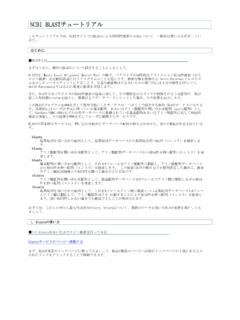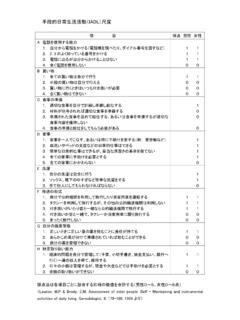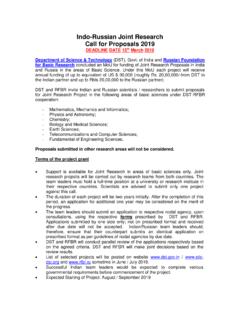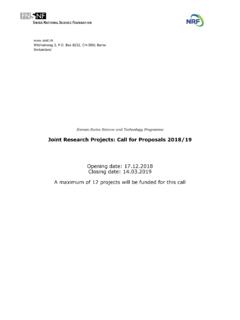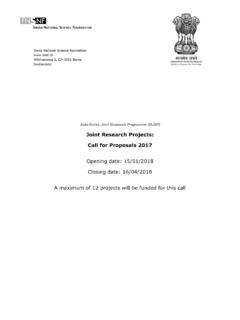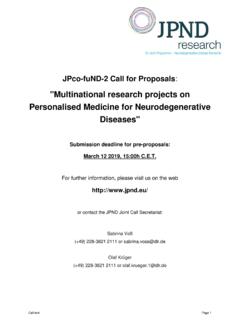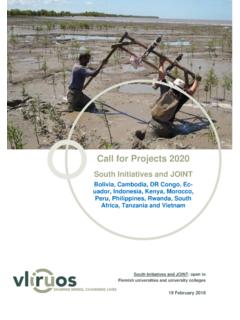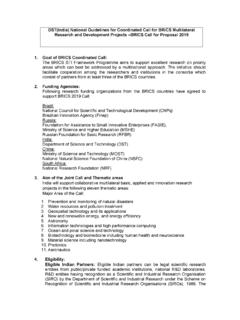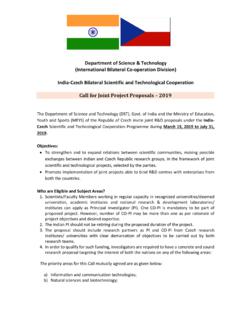Transcription of East Asia Science and Innovation Area Joint Research ...
1 East Asia Science and Innovation Area Joint Research Program on nanotechnology and Materials . st The 1 call for Proposals to be submitted by May 31, 2012. I. General Description I-1. New Scheme for Joint Funding of Thai-Vietnamese-Japanese Research Cooperation Based on the MOU, Japan Science and Technology Agency (hereinafter referred to as JST ), Ministry of Science and Technology of Vietnam (hereinafter referred to as MOST ) and National Science and Technology Development Agency of Thailand (hereinafter referred to as NSTDA ), hereinafter singularly referred to as a Party and plurally as Parties , have agreed to establish a new scheme for Joint funding of Japanese-Vietnamese-Thai cooperative activities. After consultations among the Parties, nanotechnology and Materials have been selected as the field of Research for East Asia Science and Innovation Area Joint Research Program (hereinafter referred to as e-ASIA ). I-2. Aim of e-ASIA and Research Field The aim of e-ASIA is to strengthen collaboration among Japanese, Vietnamese and Thai researchers within the field of nanotechnology and Materials to enable them to forge long-term collaborations, leading to world-class scientific results and innovative technologies.
2 nanotechnology and Materials is developing rapidly and is considered an area of strategic importance by the Parties. I-3. Prospective Applicants The Parties will invite Japanese, Vietnamese and Thai researchers to submit proposals for cooperative Research projects in the Research area described above. All applicants must fulfil national eligibility rules for Research grant application. On the Japanese side, researchers from industry may participate in the Joint collaboration. I-4. Financial Support (20120509) 1. The Parties plan to support cooperative activities including sending and inviting researchers to the counterpart countries. In principle, JST will support expenses for Japanese researchers, MOST will support expenses for Vietnamese researchers and NSTDA will support expenses for Thai researchers. II. Support by JST/MOST/NSTDA. It is anticipated that one trilateral project will be funded per call . II-1. JST. Budget for Cooperative Research Projects The budget for a project may differ each year, depending on the content of activities, but the total budget for the Japanese researcher over a full 3-year period ( 36 months) should not exceed million yen in principle.
3 (For example, a proposal may envisage a budget of million yen for the first year, 8. million yen for the second year and 6 million yen for the final year.) In case there will be clear scientific impact or merit which justifies the budget, applicants may request the total budget up to 39 Million Japanese Yen. According to the budgetary limitations for this program, the amounts will be adjusted each year. Cooperative Research Period The duration of a cooperative Research project will be three years (36 months) in total from the start date. Details of Support This program is designed to support additional expenses related to cooperation with Thai and Vietnamese counterparts for a Japanese researcher, such as expenses for travel and/or conducting seminars/symposia. A precondition for applying to this Joint call is that the main Research infrastructure is already ensured by each Research group. (20120509) 2. Funded expenses Funding provided within this call is intended to enhance the capacity of the applicants to collaborate.
4 Funding will therefore be provided mainly in support of collaborative activities and may include some of the local Research that is necessary for the collaboration. (1) Travel expenses In principle, travel expenses should be based on the rules of the institution to which the Research leader belongs. (2) Expenses for holding symposia, seminars and meetings. (3) Expenses for facilities, equipment and consumables (4) Expenses for personnel Stipend or salary for a PhD student, or salary for a post-doctoral fellow. (5) Others Expenses for creating software, renting or leasing equipment, transporting equipment, etc. (6) Overhead expenses Overhead expenses should be up to 30% of direct costs. (7)Expenses not covered/funded in the program No expenses stated below will be covered under this program: 1) Expenses related to acquiring real estate or constructing buildings or other facilities 2) Expenses related to procurement of major equipment 3) Expenses related to dealing with accidents or disasters which occur during cooperative Research periods 4) Other expenses unrelated to implementation of this cooperative Research project Contract between Applicant and JST.
5 Support will be implemented according to a contract for commissioned Research entered between JST and a university or Research institute, or similar (hereinafter referred to as the institution ). The contract for commissioned Research will be renewed each year over the cooperative Research period. (20120509) 3. Since the contract is agreed on condition that all administrative procedures related to this project be handled within the institution, the Research leader should consult with the department in charge at his/her institution. As for the contract between the Japanese institution and JST, it stipulates that Article 19 of the Industrial Technology Enhancement ACT (Japanese version of the Bayh-Dole Act) and the Article 25 of the ACT on Protection of the Creation, Protection and Exploitation of Content (tentative translation) will be applied to all intellectual property rights belonging to Japanese institution generated as a result of this project, and that these can be the properties of the institution with which the Research leader is affiliated.
6 II-2. MOST. Budget for Cooperative Research Projects Despite expenditure of a project may differ in each year, depending on the content of activities, the total budget for the Vietnamese researcher over a full 3-year period ( , 36 months) should not exceed 350,000 United State Dollars in principle. Cooperative Research Period The duration of a cooperative Research project will be three years (36 months) in total from the start date. Details of Support This program is designed to support cooperative Research activities with Thai and Japanese counterparts for a Vietnamese researcher, such as expenses for travel and/or conducting seminars/symposia. A preference is that the main Research infrastructure is already ensured by each Research group. Funded expenses Funding provided within this call is intended to enhance the capacity of the applicants to collaborate. Funding will therefore be provided mainly in support of collaborative activities and may include some of the local Research that is necessary for the collaboration.
7 (20120509) 4. Funded expenses include costs for Research activities as well as Research exchanges. The principal cost categories include labor costs for staff members and direct costs such as equipment, travel and consumables. All budget items must conform to the rules and regulations issued by of MOST. Contract between Applicant and MOST. The contract between Vietnamese Institution and MOST will be implemented according to a contract for commissioned Research entered among MOST, the Principal Investigator (hereinafter referred to as the PI), the Institution and the Line Agency of the Institution. The contract is concluded on condition that all administrative procedures related to the project shall be handled within the Institution. Matters related to intellectual property are handled in accordance with laws and State regulations which are presently enacted in Vietnam. II-3. NSTDA. Budget for Cooperative Research Projects The budget for a project may differ each year, depending on the content of activities, but the total budget for the Thai researcher over a full 3-year period ( 36 months) should not exceed 5 Million baht in principle.
8 According to the budgetary limitations for this program, the amounts will be adjusted each year. Cooperative Research Period The duration of a cooperative Research project will be three years (36 months) in total from the start date. Details of Support This program is designed to support cooperation with Vietnamese and Japanese (20120509) 5. counterparts for a Thai researcher, such as expenses for travel and/or conducting seminars/symposia. A preference is that the main Research infrastructure is already ensured by each Research group. Funded Expenses Funding provided within this call is intended to enhance the capacity of the applicants to collaborate. Funding will therefore be provided mainly in support of collaborative activities and may include some of the local Research that is necessary for the collaboration. Funded expenses include costs for Research activities as well as Research exchanges. All budget items must conform to the rules and regulations issued by NSTDA.
9 Contract between Applicant and NSTDA. Support will be implemented according to a funding contract for the Research , development and engineering project entered into between NSTDA and the Institution to which the researcher belongs. Since it is the Institution which shall enter into the contract with NSTDA, the PI. should consult with the officials responsible for coordination of receipt of Research funding and the legal representative of the Institution. The contract between Thai Institution and NSTDA shall be governed by the regulations of the National Science and Technology Development Board on funding for Research , development and engineering projects, and all other relevant rules and regulations of NSTDA. All intellectual property rights (patents, utility model or design rights, rights to programs , databases and other intangible property and know-how, and so on) which are results of the project funded under the contract shall be managed in accordance with the regulations of the National Science and Technology Development Board on management of results of projects funded by Research , development and engineering project funding.
10 In principle, NSTDA and the Institution(s) shall be jointly entitled to all intellectual property rights in the project results. The Institution, however, is entitled to a share of revenue generated from commercialization of the project results. (20120509) 6. II-4. Contract among Researchers A contract for cooperative Research shall be made for implementing actual Research collaboration. The contract for cooperative Research shall include conclusions of discussions among Parties which are entitled to intellectual property arising as a result of Research collaboration, and Institutions concerned, on the issues regarding treatments of Research information brought by researchers involved for the implementation of Research collaboration, of Research achievements as a result of Research collaboration and of intellectual properties with among the concerned parties. The agreement so concluded shall be reported to the Parties. III. Application A common application including researchers from three countries shall be submitted to each of the Parties in parallel.




